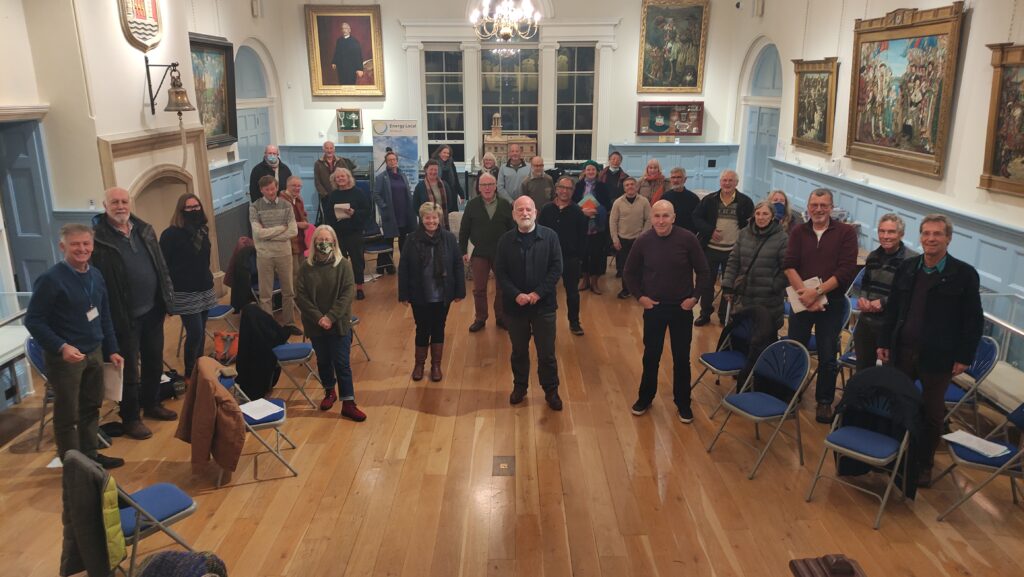


Bridport Climate Forum
Event Report
In-person forum Tuesday 23 November and online forum Wednesday 24 November 2021
1. Background
Over 40 representatives of organisations in Bridport attended two Bridport Climate Forums, held in-person and online in November 2021. The Forums were organised by two local environmental groups, Transition Town Bridport and Seeding our Future, with support and participation from the Town Council.
Along with most other local authorities, Bridport Town Council declared a Climate Emergency, in May 2019. Climate change will affect our food supplies, health, public services and way of life, but there are plenty of practical steps we can all take to reduce its impact.
The purpose of the Forums was for local community groups and voluntary organisations to explore what we can do in response to the climate crisis with our combined capacity, specifically how to widen local residents’ involvement.
The level of participation, creative ideas, and willingness to be involved in future initiatives, was very encouraging. Organisations expressed a keen interest to coordinate activities and work together, and indeed, running the forums as a joint venture between the town council, Seeding Our Future and Transition Town Bridport worked very well, and is a useful precent going forward.
2. Outcomes
In terms of specific outcomes and insights, there is a strong consensus that a larger programme of activities and widening of climate awareness and involvement is needed, as a Bridport Climate Response . It will take some time and exploration to give this initiative more shape, but below are some of the ingredients proposed at the two events.
Bridport Climate Response proposed components:
A) Bridport Climate Umbrella
A lot of the climate projects locally are quite small and may be hard to find. Some have spare capacity and many need volunteers. All have expertise that could valuably be shared more widely. So an “umbrella” function is highly desirable. In particular, this could include:
- A website with information on all the local climate related projects, resources, events etc. It is not clear yet it this needs to be a new website, or could build on a current one as a sub-section.
- A network enabling organizations to collaborate and update each other. This could include quarterly in-person meetings and an online channel. DorsetCAN (Dorset Climate Action Network) may be a role model.
B) Bridport Climate Response Communications Programme
There is a need to involve the wider Bridport public – of all ages – in the climate response. This needs professional communications help. This will likely comprise selected targeted initiatives that engage people’s interest and draw them into exploring the issues more deeply, rather than a mass leaflet drop. Social media is crucial in reaching the under 50s, but there is also great value in face-to-face communication for all ages.
C) Bridport Climate Response Events
These could be:
- A presence at existing events, such as adding a climate flavour to the Bridport Food Festival; hosting a climate themed pub quiz; or using bicycles to power the sound system at a music event.
- New events established specifically for the Bridport Climate Response, such as a monthly “walking and biking Sunday” where one of the main town streets are closed for the day, as happens in other towns and cities round the world. Also workshops for specific organisations, and open drop-in events.
D) Widen the frame of reference around climate change
Part of the function of the communications programme – but also of the whole Bridport Climate Response – will be to widen the frame of reference around climate change.Climate change will impact multiple areas of our lives and it is important to see climate responses as more than emission reduction and emergency preparation. Climate responses can include areas such as:
- Tree planting, habitat restoration and biodiversity enhancement.
- Food security and how we grow and procure local food.
- Emissions reduction in the form of how we use energy, but also our purchasing habits including buying less.
- Emergency preparedness for floods and drought, and supply disruption which could mean shortages of things we may take for granted such as food, medical supplies, and mains power.
- Mental well-being, community support for the vulnerable, and learning to live with climate change distress.
- Home building / renovation and gardening practices which are kinder to the earth and its creatures.
E) Involve young people
Surveys show that young people generally feel the deepest concern about the climate crisis and the future outlook, and that they largely feel their concerns are ignored by adults. So, let’s give them the chance to be heard, and to play a leading role in what we do locally.
3. Next steps
- Bridport Climate Umbrella: Would your organization like to be kept informed and have a chance to participate in the Bridport Climate Umbrella? If so please email with the subject “Bridport Climate Umbrella Organisation List”. This will automatically subscribe you to an email list for organisations as aprt of the Bridport Climate Response Umbrella
- Bridport Climate Response Bulletin: Do you – as an individual or organisation – want to receive occasional e-bulletins with news of progress, events etc about the Bridport Climate Response ? Please email with the subject “please subscribe me to Bridport Climate Response Bulletin”
- Scoping Meeting in December: An online meeting will be held the week of December 13, open to anyone who’d like to help with taking this forward, as an organisation or individual. If you’d like to be involved in this, please let Alan Heeks of Seeding Our Future know:

